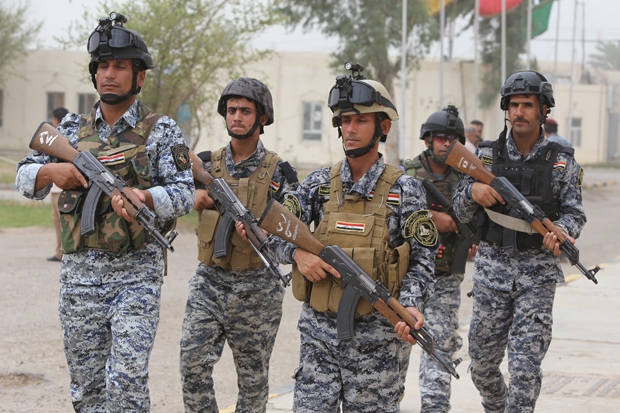[audioplayer src=”http://traffic.libsyn.com/spectator/TheViewFrom22_12_June_2014_v4.mp3″ title=”Former solider Tom Tugendhat and Fraser Nelson discuss ISIS in Iraq” startat=1758]
Listen
[/audioplayer]Seven weeks ago, Barack Obama proclaimed that ‘it’s time to turn the page on more than a decade of war’. The people of Iraq do not have this option. They’ve seen, in Basra, Iran-backed militias take on and defeat the British military. They’ve seen highly effective jihadis, disowned by al-Qa’eda for their brutality, take control of a major city, Fallujah, just 40 miles from Baghdad. This week they have seen their second city, Mosul, fall to that same band of psychopaths. If Syria is anything to go by, religious cleansing, beheadings and even crucifixions will soon begin.
A new Iraq war is now underway. On one side is Nouri al-Maliki, Prime Minister of Iraq, on the other an al-Qa’eda offshoot called the ‘Islamic State of Iraq and the Levant’ (ISIS) which aims to create an Islamic emirate in the Iraq-Syria border. It is proving remarkably successful, having already created a de facto state — now with two cities, and a substantial amount of land. This whole area, controlled by ISIS, has become a safe haven for jihadis being driven out of Pakistan by drone strikes. Terror has found a new home.
We hear little about this in Britain because it is not a problem anyone is inclined to solve. Privately, the Foreign Office is operating on the assumption that ISIS will keep the land it now holds, for the next few years at least. In Washington, officials are saying that the fall of Mosul is not regarded as a serious turning-point. There is no appetite to become embroiled in another war, or even to give the Iraqi army the air support it would need to retake Mosul. The unofficial policy is to let ISIS create its new country, and keep talking as if Iraq is on a bumpy road to democracy.
The fall of Mosul is a catastrophe but it speaks volumes about the direction of the region. Borders are falling apart as groups like ISIS render the differences between countries unimportant. Just as the border between Afghanistan and Pakistan was irrelevant for the militants, so the border between Iraq and Syria has become irrelevant now. It is impossible to talk about one country without discussing the other.
Barack Obama used to boast that al-Qa’eda was on the run — its leadership decapitated and hounded out of the West. Much of this was true. But it now emerges that America and Britain have been chasing shadows: as soon as they outmanoeuvre one enemy, another emerges,. ISIS represents not a manifestation, but the very embodiment of the terror America and her allies are meant to have been at war with since 9/11.
If the Iraqi army fails to dislodge ISIS from Mosul, then we will know what to expect next. When the black flag is hoisted above public buildings — as was being done by Wednesday morning — a reign of terror begins. The city’s remaining Christians, who centre around its Catholic Chaldean cathedral, will be rounded up. A few months ago, in the northern Syrian city of Raqqa, Christians were asked to ‘register’ with the ISIS under an ancient law called the dhimmi contract. It meant that Christians either had to pay a tax, and agree to be treated as third-class citizens, or ‘face the sword’. This explains why Mosul’s Christians are this week fleeing for their lives towards the Kurdish border.
Even there they may not be safe for long. The Kurdish areas in the north are now looking vulnerable to ISIS, Erbil in particular (only an hour or so from Mosul). It will be particularly sad if Erbil falls because it has been a haven of peacefulness pretty much since 2003. The Kurdish experiment in the north was a great economic, investment and security success, but the Kurds who managed to survive Saddam now find a mutant strain of al-Qa’eda on their borders, and lack the military firepower to repel the invader.
During the Afghanistan war, Tony Blair said that intervention in Helmand would stop us having to fight jihadis on the streets in Britain. That was far-fetched. But the consequences of ISIS will be wide-reaching. We know that some 450 young British Muslims have gone to fight with the jihadis in Syria, many have come back — and a worryingly high number can no longer be tracked by the security services. Police believe they are already seeing examples of terrorist attacks being plotted by young veterans of this Syrian jihad.
The West does have options. The Iraqi army needs air cover to retake Mosul; the Kurds can also do with our help. But as we have learned over the last 15 years, it is dangerous to think that there is such a thing as an in-and-out military operation: if we intervene, we ought to be prepared for longer entanglement. David Cameron may well feel that he does not have the resources to respond to the rise of ISIS. But this is not a problem we will have the luxury of watching from afar.





Comments